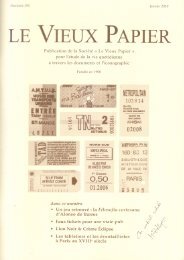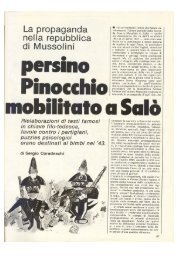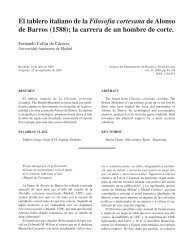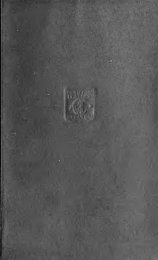Board games from the city of Vijayanagara (Hampi ... - Gioco dell'Oca.
Board games from the city of Vijayanagara (Hampi ... - Gioco dell'Oca.
Board games from the city of Vijayanagara (Hampi ... - Gioco dell'Oca.
You also want an ePaper? Increase the reach of your titles
YUMPU automatically turns print PDFs into web optimized ePapers that Google loves.
SUMMARIES / RÉSUMÉS / ZUSAMMENFASSUNGEN 131<br />
tables with symbols <strong>of</strong> war – this<br />
combination seems to be a German<br />
speciality <strong>of</strong> this time. Three splendid<br />
<strong>games</strong> tables <strong>from</strong> <strong>the</strong> court <strong>of</strong> Max<br />
Emanuel <strong>of</strong> Bavaria (end <strong>of</strong> <strong>the</strong> 17th<br />
century) <strong>of</strong>fer tactical <strong>games</strong> such as<br />
chess/draughts, morris and backgammon;<br />
<strong>the</strong>y allude to <strong>the</strong> Turkish wars <strong>of</strong> <strong>the</strong><br />
17th century. These <strong>games</strong> tables are<br />
related to <strong>the</strong> frequent depiction <strong>of</strong> battle<br />
scenes towards <strong>the</strong> end <strong>of</strong> <strong>the</strong> 17th<br />
century, when <strong>the</strong> Christians defeated<br />
<strong>the</strong> Ottomans.<br />
But <strong>games</strong> <strong>of</strong> chance can also be combined<br />
with war allegories, as a gambling table in<br />
<strong>the</strong> residence in Würzburg <strong>from</strong> 1741<br />
shows it. Here, <strong>the</strong> ambiguous role <strong>of</strong><br />
gambling at court becomes evident: it was<br />
morally condemned but at <strong>the</strong> same time<br />
it was a privilege <strong>of</strong> <strong>the</strong> nobility and served<br />
to express <strong>the</strong>ir wealth. Combined with<br />
allegories <strong>of</strong> war, gambling expressed <strong>the</strong><br />
sovereign’s power. Maybe it was <strong>the</strong><br />
political situation in Germany which<br />
caused <strong>the</strong> combination <strong>of</strong> <strong>games</strong> tables<br />
and war symbols: Germany consisted <strong>of</strong><br />
small territorial courts. The territorial<br />
sovereigns had to claim <strong>the</strong>ir power and<br />
regency with all might. Games tables<br />
represent <strong>the</strong> privileges <strong>of</strong> <strong>the</strong> nobility to<br />
gamble, but also <strong>the</strong>ir education and<br />
intelligence to be able to play chess. An<br />
implication is also that only in times <strong>of</strong><br />
peace, which can only be assured by<br />
success at war, <strong>the</strong>re is a time to play<br />
<strong>games</strong>.<br />
ANDREW MORRIS-FRIEDMAN and<br />
ULRICH SCHÄDLER<br />
“Juden Raus!” (Jews Out!) –<br />
History’s most infamous board<br />
game<br />
<strong>Board</strong> <strong>games</strong> can be used by cultural<br />
historians to gain insights into <strong>the</strong> values<br />
<strong>of</strong> different cultures. Many modern<br />
<strong>games</strong> have been based on <strong>the</strong> <strong>the</strong>me <strong>of</strong><br />
teaching moral values <strong>of</strong> <strong>the</strong> cultures that<br />
produce <strong>the</strong>m. One game <strong>of</strong> moral values<br />
however, stands out as <strong>the</strong> most infamous<br />
board game <strong>of</strong> all time. The game <strong>from</strong><br />
Germany, “Juden Raus!” (Jews Out!)<br />
depicts <strong>the</strong> policy <strong>of</strong> racial hatred that<br />
defines <strong>the</strong> Nazi era. It was designed as a<br />
family board game that simulates <strong>the</strong><br />
start <strong>of</strong> <strong>the</strong> persecution against <strong>the</strong> Jewish<br />
people <strong>of</strong> that era. As to <strong>the</strong> surprise <strong>of</strong><br />
<strong>the</strong> producer <strong>of</strong> <strong>the</strong> game he had<br />
miscalculated: heavily criticized by <strong>the</strong><br />
Nazis, <strong>the</strong> announced “bestseller”<br />
flopped, even before it was properly<br />
marketed.<br />
MANFRED ZOLLINGER<br />
Two unknown rules for <strong>the</strong><br />
Game <strong>of</strong> Goose: Ulisse<br />
Aldrovandi and Duke August<br />
<strong>the</strong> younger <strong>of</strong> Brunswick-<br />
Luneburg<br />
The Game <strong>of</strong> Goose is certainly one <strong>of</strong><br />
Europe’s best-known <strong>games</strong>. The earliest<br />
records and examples are presented here<br />
first and <strong>the</strong> place <strong>of</strong> <strong>the</strong> Game <strong>of</strong> Goose<br />
in <strong>the</strong> game-related <strong>the</strong>ories <strong>of</strong> early<br />
Modern Times is examined. Although it<br />
is a game <strong>of</strong> pure chance, it has never<br />
been considered as a shocking game, but<br />
as a permitted entertainment. From this<br />
point <strong>of</strong> view <strong>the</strong> Author studies its<br />
evolution towards a game specifically<br />
designed for children. The article<br />
presents two unknown hand-written<br />
rules that come <strong>from</strong> a learned milieu.<br />
The first one comes <strong>from</strong> <strong>the</strong> Bolognese<br />
naturalist Ulisse Aldrovandi (late 16th<br />
century), <strong>the</strong> o<strong>the</strong>r one (c. 1623) is owed<br />
to Prince August <strong>the</strong> Younger <strong>of</strong>







